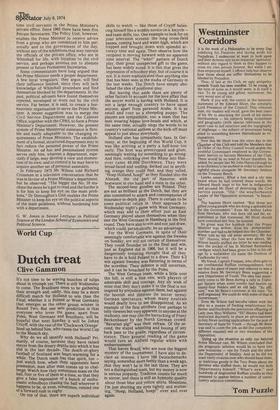Westminster Corridors
It is the work of a Philosopher to be every Day subduing his Passions and laying aside his Prejudices. I endeavour at least to look upon and their Actions only as an impartial 'spectator, without any regard to them as they happen to cross my own private Interest. But while I am thus employed myself. I cehnot help but observe how those about me suffer themselves to be blinded by Prejudice.
Thus, of late at the Club, an ugly antipathy towards Youth has been manifest To be young, in the eyes of some so it would seem, is in itself a vice. To be young and gifted, moreoever, the. very worst sort of vice.
Mark, if you will, the outcry at the innocent statement of Mr Edward Short, the scholarly Lord President of the Council. This virtuous man, my readers will recall, gave the best years of his life to educating the youth of his native Northumbria — his subjects being investment and geography (with special reference in the latter case to soil structure and the topography of slagheaps — the subject of investment being allied to something known thereabouts as reclamation).
Now this Mr Short rose the other day in the chamber of the Club and told the Members that an Order of the Privy Council would enable the
youthful Commissars employed in the Govern ment Service to become Members of the Club. There would be no need in future therefore, he added, for people like Mr John Harris (though he is no chicken) to be enobled in order to take their rightful places alongside Mr Secretary Jenkins on the Treasury Bench.
Lawks amercy. What a hue and a cry was heard when he had uttered these words. Mr Edward Heath leapt to his feet in indignation and accused Mr Short of destroying the Civil Service system. "Old," the weatherbeaten Leader of the Opposition screamed, "is beautiful."
The hapless Short replied: "But these are gifted young people who are doing a splendid job for the Government." Even Mr Arthur Lewis from Newham, who was born old and fat, expostulated at that statement. Mr Short should have consulted him first, he insisted.
So great was the hubbub that the Prime Minister was woken from his postprandial slumber and had to be helped into the Chamber. When told by his old press secretary, Mr Joe "SS" Haines, what the fuss was about. Mr Wilson hastily stuffed the letter he was reading into the pocket of his St Michael Rentasleep cardigan which had been given to him in his old age by a wellwisher (to name the Duchess of Faulkender for one).
My friend, Captain Freepen, who often gets to see confidential Ruffian correspondence, told me that the piece of paper just referred to was a missive from Mr Secretary Benn suggesting a new Department of Youth. The idea had appar ently come to Mr Benn during a rally in Trafal gar Square when some youths had beaten up ninety-four Peelers and an old lady. "So effi cent,' was Mr Benn's comment at the time. "So well organised. We could do with some of that in Government."
Even Mr Wilson had becofne taken with the idea as a means of finding employment for Senlac and Hardrada the precocious offspring of Lady (nee Mrs) Williams. "SS" Haines had been instructed discreetly to place an advertisement inGay News inviting applications for the post of Secretary of State for Youth — though Mr Benn was said to covet the job, as did (for completely different reasons) one or two members of the Opposition.
Sizing up the situation as only our beloved Prime Minister can, Mr Wilson concluded that the pragmatic solution would be to have two new ministries — one for Youth and the other the Department of Senility. And as he did not want nasty rivalries over who should head them, or malicious gossip in the Tory Press about the deviates who staffed them, he would run both Departments himself. "What's new," said hundreds of disgruntled Ruffian youths as they prepared to appear before a number of constituency selection committees.
'Tom Puzzle


































 Previous page
Previous page